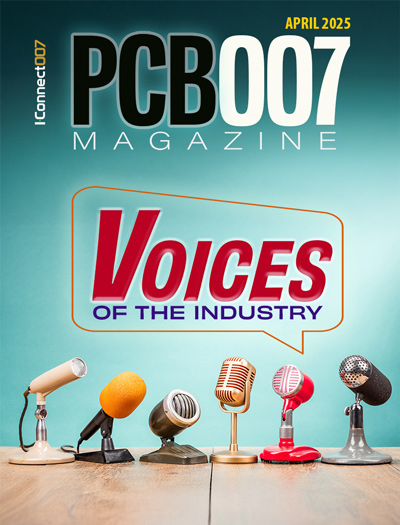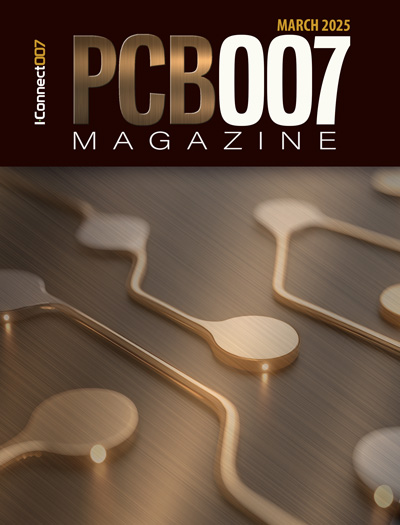-

- News
- Books
Featured Books
- pcb007 Magazine
Latest Issues
Current Issue
Voices of the Industry
We take the pulse of the PCB industry by sharing insights from leading fabricators and suppliers in this month's issue. We've gathered their thoughts on the new U.S. administration, spending, the war in Ukraine, and their most pressing needs. It’s an eye-opening and enlightening look behind the curtain.

The Essential Guide to Surface Finishes
We go back to basics this month with a recount of a little history, and look forward to addressing the many challenges that high density, high frequency, adhesion, SI, and corrosion concerns for harsh environments bring to the fore. We compare and contrast surface finishes by type and application, take a hard look at the many iterations of gold plating, and address palladium as a surface finish.

It's Show Time!
In this month’s issue of PCB007 Magazine we reimagine the possibilities featuring stories all about IPC APEX EXPO 2025—covering what to look forward to, and what you don’t want to miss.
- Articles
- Columns
Search Console
- Links
- Media kit
||| MENU - pcb007 Magazine
What a Long, Strange Trip it’s Been—and It’s a Long Way from Being Over
February 9, 2016 | Barry Matties, I-Connect007Estimated reading time: 14 minutes
Miller: Pitch is the problem. As densities go down and the pitch gets smaller there is a bridging problem with solder, so everyone knows solder is the main cause of reliability issues in electronics. I can't quantify it. Werner Engelmaier wrote a lot about that and he wasn't the only one. Then on top of it they throw in this lead-free solder, which had no environmental justification whatsoever. What put it over the top? People blame the European community and environmentalists, but it was really the tin industry and the solder industry—they put it over the top. It was a political thing. Nobody could ever prove that people made fortunes on speculating tin [laughs], so we will never know, right? But I am sure that a lot of money was made that way.
Matties: I know that Joe was a big opponent to the whole thing and was very vocal about it, but it didn't seem to matter.
Miller: Pam Gordon was commissioned to come up with the cost of the transition to lead-free.
Matties: Technology Forecasters?
Miller: That’s right, and I think she came up with $30 billion and still counting. The military can't use it due to reliability and the little tin whiskers.
Matties: Was that move to lead-free a surprising moment in our history to you?
Miller: It was surprising, because I am not a realist. Everybody who was a realist knew it was going to happen. We kept fighting because we are just really good at fighting losing battles [laughs]. We are going to have the last word when they eliminate all solder.
Matties: And they will.
Miller: The lead-free people made a contribution to that. That is the irony of it. By reducing the reliability of all solder they helped seal its fate.
Matties: When you look to the future, obviously you have a lot to draw on from the past. What advice would you give a manufacturer?
Miller: Be flexible; you just have to be flexible. The industry is full of corpses, isn't it? You see them all over, and not just in this industry. Eastman Kodak is a classic case. They knew that electronic imaging was coming. They even had patents on it, and they even brought out an electronic camera which wasn't based on silver halides. But the thing that really killed it was putting cameras on cellphones. So you don't have to wait for film to develop.
Matties: Kodak had a digital camera, but they were just so locked into the old paradigm.
Miller: It is the old classic case. Everybody gets in a rut—companies get in a rut, people get in a rut, it is natural. It is the first law of Newton's Laws, isn't it? Inertia. Especially when they were making money on all that paper being developed. And all the people in power got in power because they were making money on the old technology, so it is very hard for them to see the threat. They sort of wanted to pretend it was going away, because it was such a threat. People don't want to see threats.
Matties: What do you think about all the automation that is coming to factories?
Miller: The more the better.
Matties: It changes the need for the labor pool.
Miller: Well, it is the old story then. People will do more productive things. Let the machines do the work.
Matties: It also makes a case that you don't need to have a specialized skillset, because that is one of the problems in America. If you look at the machining industry, trying to find a skilled machinist today is virtually impossible, but finding someone that can run a computer that runs the machining is quite easy.
Miller: That is a good point.
Matties: And I think we are going to see a shift in labor, but one thing that is surprising to me is that the process of manufacturing a circuit board hasn’t changed all that much. The high-end or the technological shift has been in the equipment we use to plate a circuit board or to image a circuit board, but the process for building a circuit board has not changed that much.
Miller: No, it hasn't changed that much. Ken Gilleo did a great job on delving into the history at Technograph, but it grew out of other industries. New industries always do. It grew out of graphics and printing and borrowed from a lot of other industries and as needs grew, people came up with solutions. Then it grew into something that will probably become obsolete pretty soon. But that is always the scenario.
Page 2 of 3
Suggested Items
Indium’s Karthik Vijay to Present on Dual Alloy Solder Paste Systems at SMTA’s Electronics in Harsh Environments Conference
05/06/2025 | Indium CorporationIndium Corporation Technical Manager, Europe, Africa, and the Middle East Karthik Vijay will deliver a technical presentation on dual alloy solder paste systems at SMTA’s Electronics in Harsh Environments Conference, May 20-22 in Amsterdam, Netherlands.
SolderKing Achieves the Prestigious King’s Award for Enterprise in International Trade
05/06/2025 | SolderKingSolderKing Assembly Materials Ltd, a leading British manufacturer of high-performance soldering materials and consumables, has been honoured with a King’s Award for Enterprise, one of the UK’s most respected business honours.
Knocking Down the Bone Pile: Gold Mitigation for Class 2 Electronics
05/07/2025 | Nash Bell -- Column: Knocking Down the Bone PileIn electronic assemblies, the integrity of connections between components is paramount for ensuring reliability and performance. Gold embrittlement and dissolution are two critical phenomena that can compromise this integrity. Gold embrittlement occurs when gold diffuses into solder joints or alloys, resulting in mechanical brittleness and an increased susceptibility to cracking. Conversely, gold dissolution involves the melting away of gold into solder or metal matrices, potentially altering the electrical and mechanical properties of the joint.
'Chill Out' with TopLine’s President Martin Hart to Discuss Cold Electronics at SPWG 2025
05/02/2025 | TopLineBraided Solder Columns can withstand the rigors of deep space cold and cryogenic environments, and represent a robust new solution to challenges facing next generation large packages in electronics assembly.
BEST Inc. Reports Record Demand for EZReball BGA Reballing Process
05/01/2025 | BEST Inc.BEST Inc., a leader in electronic component services, is pleased to announce they are experiencing record demand for their EZReball™ BGA reballing process which greatly simplifies the reballing of ball grid array (BGA) and chip scale package (CSP) devices.


